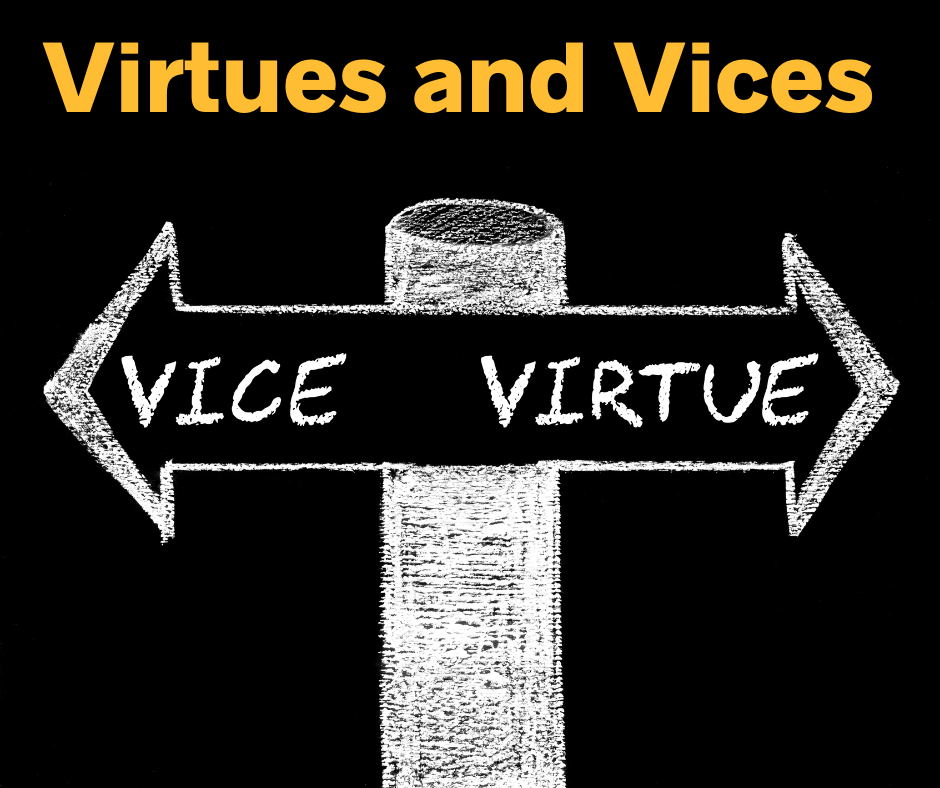
In today’s podcast, we talk about vices and virtues. You’ll learn vocabulary connected to the seven deadly sins and the seven heavenly virtues. Can you name all of them in English?
Voice message from Wessel from Brazil.
Virtue means having good moral qualities or behaving in a morally good way. The adjective is virtuous.
“Being kind and helpful to others is a virtue.”
“She considered herself very virtuous because she neither drank alcohol nor smoked.”
“Sharing what you have is a good example of virtue.”
“Silence is a virtue,” they say.
Vice refers to bad habits or immoral behavior
“Eating too much chocolate is my vice.”
“The city has problems with filth and vice.”
“Greed is considered to be a vice.”

https://www.englishcraig.com/
The seven deadly sins, also known as the capital vices or cardinal sins, are a grouping of vices within Christian teachings. They are considered contrary to the seven heavenly virtues. Here they are:
Pride: Excessive belief in one’s abilities or importance.
Greed: Excessive desire for material wealth or possessions.
Wrath: Intense anger or violent feelings.
Envy: Jealousy or resentment toward others’ success or possessions.
Lust: Intense desire for sexual pleasure.
Gluttony: Overindulgence in food or drink.
Sloth: Laziness or lack of motivation.
These sins have been discussed in treatises and depicted in various forms of art throughout history. They are also sometimes called the cardinal sins or capital vices
The seven heavenly virtues.
Faith is belief in the right things (including the virtues!).
Hope is taking a positive future view; that good will prevail.
Charity is concern for, and active helping of, others.
Fortitude is never giving up.
Justice is being fair and equitable with others.
Prudence is care of and moderation with money.
Temperance is moderation of needed things and abstinence from things which are not needed.
Questions
What are your virtues and vices?
Is honesty always a virtue? Are there any situations where being honest might cause harm?
What virtues do you admire in others?
What’s your least favourite vice in others?
How do cultural differences impact our perception of virtues and vices? Are there universal virtues, or do they vary across cultures? For example: https://www.youtube.com/watch?v=cxzlDp43I2I
Is forgiveness a virtue or a weakness?
What vices are common in today’s society? (addiction, materialism, greed, environmental negligence)
…and now it’s your turn to practise your English. What are your virtues and vices? We’ve told you ours, why not share yours and practise your English?
Send us a voice message. https://www.speakpipe.com/inglespodcast
Send us an email with a comment or question to [email protected] or [email protected]
If you’re a Spanish speaker and you want to study for free, visit the mansioningles website and for paid eBooks and audios for self-study check out the online store: https://store.mansioningles.net/
Thank you to our Patreon supporters. Join our Patreon program for as little as $1.50 per month and you get instant access to the transcriptions of this podcast. https://www.patreon.com/inglespodcast
Welcome to our new Patreon supporters who have joined us this month:
Charly
Orlando olivares
Francisco Armas
Milagros Seveso
Ignacio Gil Ruiz
If you enjoyed this podcast, please tell your friends.
The music in this podcast is by Pitx. The track is called ‘See You Later’



